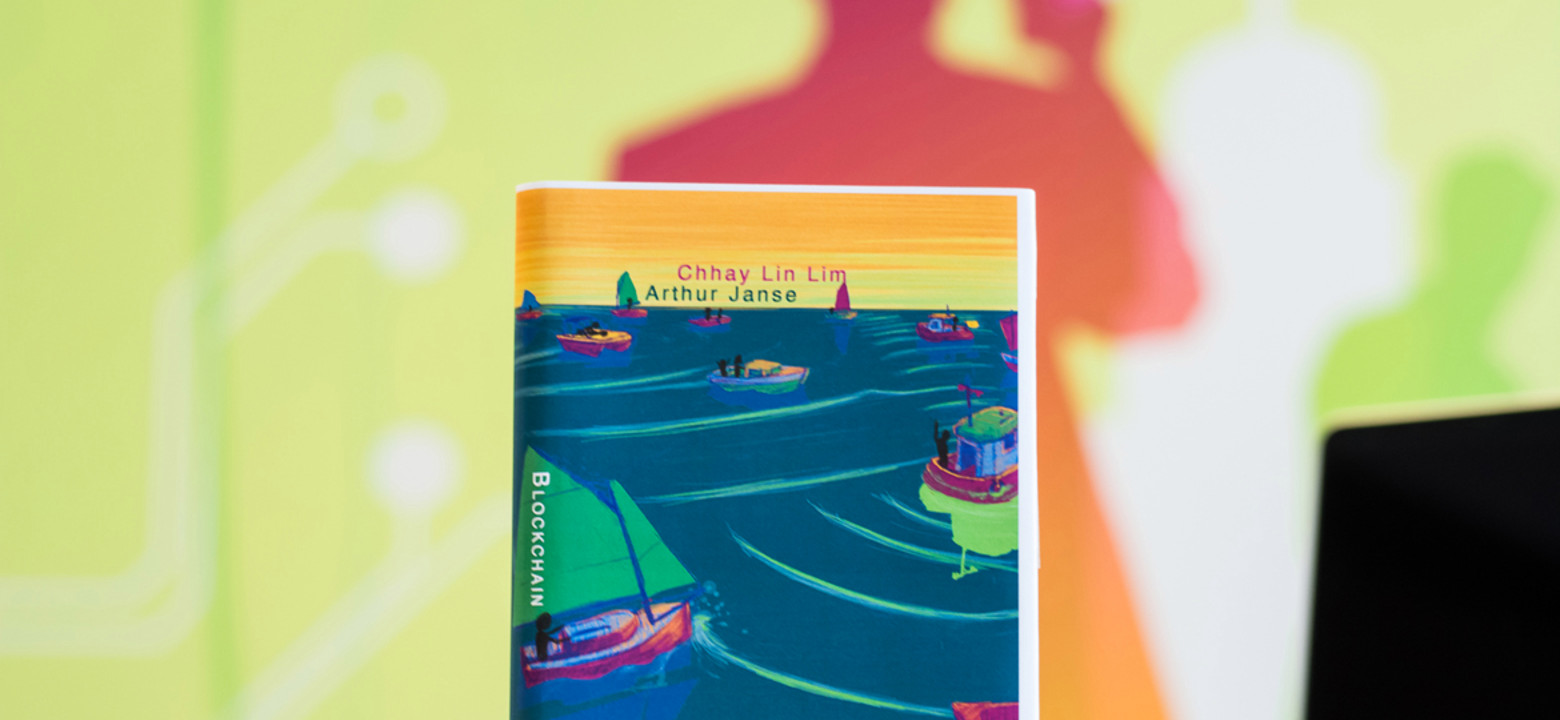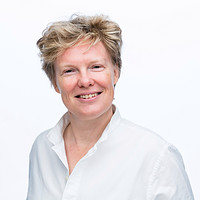Saxion lecturers introduce a blockchain primer to the market
Arthur Janse and Chhay Lin Lim: both of these Saxion lecturers were impressed by the increasing and unprecedented possibilities that the blockchain phenomenon will offer the world. They joined forces and wrote a blockchain primer (Basisboek Blockchain), which will be published in digital form on 15 November and as a hard copy at the beginning of December. Chhay: ‘We have written a book that was not available in the Netherlands. It was a pioneering effort, but we have many more plans up our sleeves.’
Congratulations on your forthcoming publication, Chhay and Arthur! What made you come up with the idea to write this book?
Arthur: ‘We are both lecturers at the School of Finance and Accounting (FEM) and affiliated with the Saxion Blockchain research group. Everything gained momentum when the research group was established. Chhay: Together with Arthur, we hold lectures for the Digital Business Models and Blockchain minor. As part of our minor, I give lectures about blockchain and digital technology. I started to look for good Dutch textbooks for the lectures about blockchain, ones that I could use with my students. I didn’t manage to find any in the market that appealed to me. Many of the books were very basic. I couldn’t find anything that had the depth that I needed to really explain the blockchain concept to our students.’ Arthur: ‘Chhay asked me to help him, and together we have tried to write a book that explains this kind of internet technology to students and anyone else who is interested. In the process, we wondered what students really needed to know about blockchain based on our curriculum. That approach, based on the requirements of a university of applied sciences, did not exist. We also wrote the book with the professional field in mind. We asked ourselves what knowledge about blockchain is required. We took the leap.’
I should think it was a huge challenge to write a primer about a topic that is constantly changing.
Chhay: ‘It was! We consulted a great many online sources, from scientific journals to news articles. We believe this blockchain primer is the starting point for a digital follow up. It will be easy to publish new editions of the e-book version, which will be available free of charge. We also want to launch an open online platform where students and other experts can share knowledge about blockchain.’ Arthur: ‘It actually stems from the idea underlying blockchain: sharing knowledge together in the same way on the internet. We want everyone to be able to share in this. In fact, this book is no more than an excuse to start exchanging that knowledge with each other.’
We believe this blockchain primer is the starting point for a digital follow up.
Is the philosophy on which blockchain is based also evident in the book?
Chhay: ‘Our book comprises three sections. In the first part we explain the real basics of blockchain. We discuss the building blocks of blockchain and what the Web 1.0 applications of this technology are. How did that then evolve into blockchain 2.0? And how do you build applications on a blockchain which you can use to facilitate all kinds of confidential online data exchange? One of the blockchain 2.0 projects that we are discussing is Ethereum. The second section of the book is indeed about the philosophy underlying blockchain. To explain the concept and that technology, it is important that we first explain how blockchain came about. The third part focuses on applying blockchain in a business context. We have kept our scope wide and we give many specific examples, so that the knowledge can also be applied in all kinds of sectors.’ Arthur: ‘Blockchain is actually an opportunity to take basic principles, such as liberalism, freedom, openness and sharing, one step further. It is the technical embodiment of an ancient philosophy.’
Let's go back to how blockchain came about and the philosophy it is based on.
Chhay: ‘Take the pioneers in the blockchain world: they are techno-libertarians. These are people who believe strongly in the right to self-determination, on which the right to freedom, to property and the right to life is based. Those principles are deeply rooted. You can translate this idea into using technology to guarantee such liberties and self-determination. Everything that you put into a blockchain is encrypted. You cannot change that data anymore. You can use a blockchain to record that you are the owner of something: of a piece of land, or of something else that has a certain value. Take, for instance, the right to freedom of expression. The contents of an article that is on a blockchain can no longer be changed. It cannot be censored, such as by governments who would like to do that. If you want to change or censor something, you actually have to go through all the computers and get your changes approved. Some blockchain networks consist of thousands of computers, spread across the planet, which all have the exact same copy of the blockchain. So censoring data or putting malicious information into the blockchain is virtually impossible. Blockchain therefore reinforces or supports the freedoms that the techno-libertarians wanted to promote.’
When did the link between self-determination and the way in which that could be made technically possible arise?
Chhay: ‘It is based on cryptography technology. It’s also known as secret script or encrypted script. Until the 1970s, it was intelligence services and governments that mainly used the technology. A group of professors then developed public-key cryptography. That made it possible for several people to generate strong encryptions that everyone could use to encrypt their own messages. That technology was so strong that even governments were no longer able to crack encryptions. This in turn led to tension between governments and cryptographers. This raised the question of whether people were allowed to encrypt their own data. These techno-libertarians have been developing technology since the 1970s that has contributed to the creation of the blockchain. Digital applications like anonymous currencies, encrypted currencies and encrypted e-mails all stem from those basic principles. These kinds of applications are in fact a manifestation of the right to voluntary trade, freedom of expression and the right to privacy, for instance. If I send you a message via WhatsApp, it is encrypted and private. That is now possible thanks to those developers who have been working on these technologies since the 1970s.’
And now?
Arthur: The internet is now broken in the sense that it is no longer as decentralised as it was originally intended. You are no longer the owner of your own data. You use central services and organisations to communicate and manage your affairs. Your digital identity is also no longer safeguarded. Data that is linked to your digital identity is traded, and privacy is always an issue. Look what has happened at Facebook, for instance. Using blockchain technology, you can get rid of those intermediaries who manage and use your data. We outline ways of doing this in our book. It won’t be the case in the near future, but in 10 or 15 years the world will be a very different place. Back in the day, I saw the rise of the internet as an opportunity to exchange our opinions and knowledge with each other, decentrally. Things have turned out differently, thanks to the intervention of major intermediaries. Blockchain is a second chance to be free to organise things with one another on the internet as we see fit. I foresee that there will be two parallel systems: one in which people can operate decentrally, and one in which the government has a hand.
And now all that knowledge will soon be laid down in the Dutch Blockchain Bible?
Arthur: ‘It really is intended as a primer, yes. First we aimed at producing a 150-page publication, but it will be around 450 pages instead. Our book will soon be distinguished by its broad perspective, from philosophy to technology, and by the fact that it is written in Dutch. We intend to use the proceeds from the sale of the hard copies to pay for the English translation. The next step is an open-source, open-access platform and the expansion of our cooperation with a number of other universities of applied sciences that are working on in this subject. It is clear to me that we have a good reputation in this field in the Netherlands, and so we want to stay at the forefront of developments together with others. When I heard back then that, in the future, I would be able to buy and pay for cinema tickets from my bank account using a mobile phone, I could not wait until that time came and that promise would be met. I feel the same way about the future opportunities that we will all have at our disposal thanks to blockchain. I will soon be able to make a direct contribution through microfinancing to someone who wants to expand his or her farming business in Africa by buying another cow – without the intervention of banks and governments, without the risk of corruption. Closer to home, twenty sole traders will soon be able to create a medical expenses buffer via a blockchain, in a completely secure and private system. Blockchain is going to offer us, as individuals, plenty of freedom and new opportunities. That promise will soon be kept. Just wait and see.’

The blockchain primer entitled Basisboek Blockchain by Chhay Lin Lim and Arthur Janse will be published digitally on 15 November and as a hard copy on 7 December. The PDF version can be requested from them free of charge. The book will also be available in both formats via Saxion Library. In addition, Arthur and Chhay will give blockchain master classes for professionals and will hold a Blockchain Week in the week beginning 13 January 2020. So don’t hesitate to contact Arthur and Chhay if you want to learn more about the Digital Business Models and Blockchain minor, the blockchain master classes and the upcoming Blockchain Week
